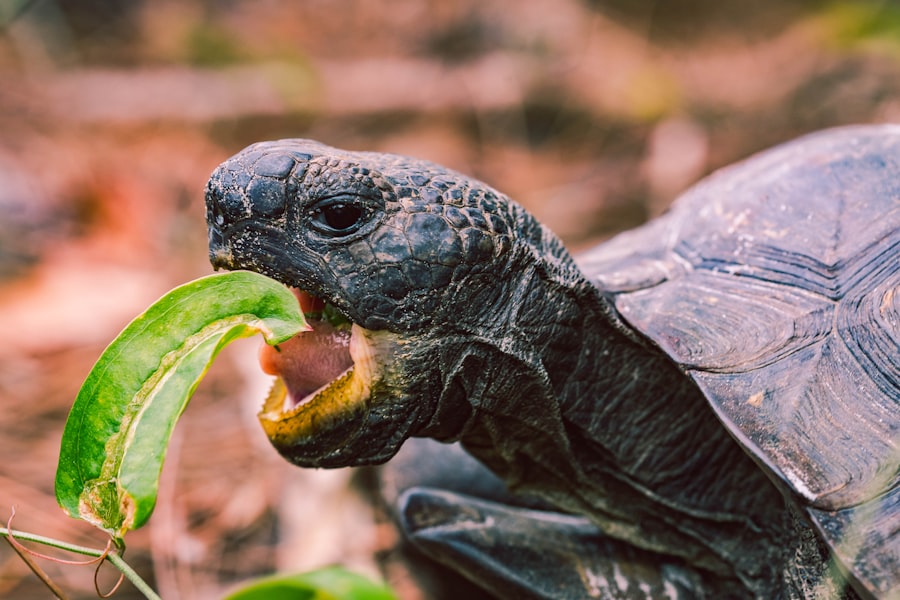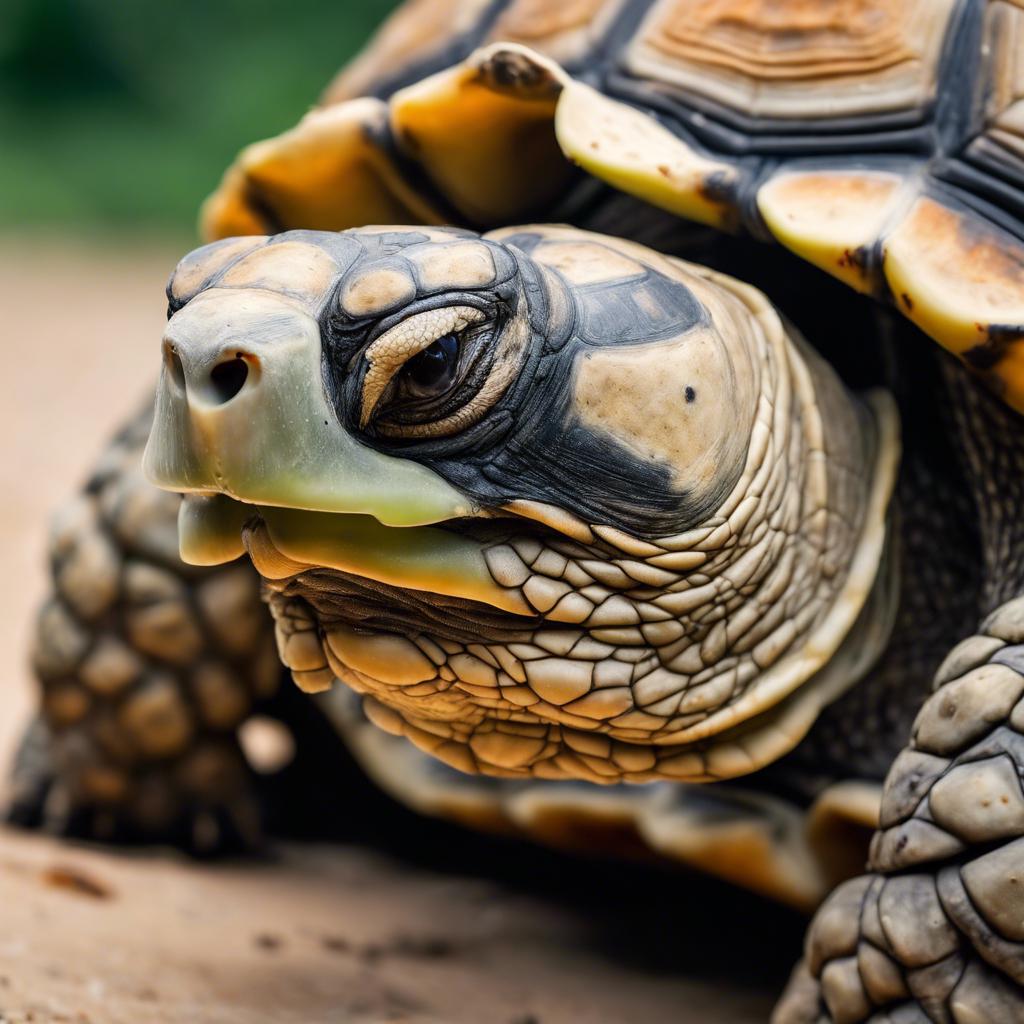Tortoises are herbivorous reptiles that have specific dietary needs to ensure their health and well-being. A balanced diet is crucial for tortoises as it provides them with the necessary nutrients to support their growth, development, and overall health. In the wild, tortoises primarily feed on a variety of plants, including grasses, weeds, flowers, and leaves. However, when kept as pets, it is important for tortoise owners to replicate their natural diet as closely as possible.
Key Takeaways
- Tortoises can eat a variety of vegetables and fruits as part of their diet.
- Cucumber is safe for tortoises to eat and can provide some nutritional benefits.
- Cucumber is low in protein and high in water content, making it a good addition to a tortoise's diet.
- When feeding cucumber to tortoises, it should be chopped into small pieces and offered in moderation.
- While cucumber can be a healthy addition to a tortoise's diet, it should not be the only food they eat and should be balanced with other vegetables and fruits.
Can Tortoises Eat Cucumber?
One common question that tortoise owners often ask is whether or not tortoises can eat cucumber. The answer is yes, tortoises can eat cucumber and it can be a suitable addition to their diet. Cucumber is a low-calorie vegetable that is rich in water content, making it a hydrating and refreshing food for tortoises. It also contains essential vitamins and minerals that are beneficial for their overall health.
Nutritional Value of Cucumber for Tortoises
Cucumber has a relatively low nutritional value compared to other vegetables, but it still provides some important nutrients for tortoises. It is a good source of vitamin K, which is essential for blood clotting and bone health. Cucumber also contains small amounts of vitamin C, which helps boost the immune system and promotes healthy skin. Additionally, cucumber is rich in water content, which helps keep tortoises hydrated.
How to Feed Cucumber to Tortoises
When feeding cucumber to tortoises, it is important to properly prepare and serve it to ensure their safety and well-being. First, make sure to wash the cucumber thoroughly to remove any dirt or pesticides. It is also recommended to peel the cucumber before feeding it to your tortoise, as the skin can be tough and difficult for them to digest.
Next, slice the cucumber into small, bite-sized pieces that are easy for your tortoise to eat. It is important to avoid feeding them large chunks of cucumber, as this can pose a choking hazard. You can serve the cucumber pieces on a shallow dish or directly on the ground, depending on your tortoise's feeding habits.
Benefits of Feeding Cucumber to Tortoises
Feeding cucumber to tortoises can provide several benefits for their health and well-being. Firstly, cucumber is a hydrating food that can help prevent dehydration in tortoises, especially during hot weather or if they are not drinking enough water. The high water content in cucumber can also help with digestion and prevent constipation.
Cucumber is also a low-calorie food, which can be beneficial for tortoises that are prone to obesity. It can be a healthy and filling snack that satisfies their hunger without adding excessive calories to their diet. Additionally, the vitamins and minerals found in cucumber can contribute to a tortoise's overall health and immune system function.
Precautions While Feeding Cucumber to Tortoises

While cucumber can be a suitable addition to a tortoise's diet, there are some precautions that should be taken to ensure their safety and well-being. Firstly, it is important to avoid overfeeding cucumber to tortoises. While it is a healthy food, it should still be consumed in moderation as part of a balanced diet.
It is also important to avoid feeding your tortoise cucumber exclusively or as the main component of their diet. Tortoises require a diverse range of foods to meet their nutritional needs, so it is important to offer them a variety of vegetables, fruits, and other plant-based foods.
Other Vegetables and Fruits Suitable for Tortoises
In addition to cucumber, there are several other vegetables and fruits that are suitable for tortoises. Some examples include leafy greens such as kale, spinach, and dandelion greens, as well as vegetables like bell peppers, carrots, and zucchini. Fruits such as strawberries, melons, and apples can also be offered as occasional treats.
Each of these foods has its own nutritional value and benefits for tortoises. Leafy greens are rich in vitamins and minerals, while vegetables provide additional fiber and nutrients. Fruits should be offered sparingly due to their higher sugar content.
How Much Cucumber Should You Feed Your Tortoise?
When it comes to feeding cucumber to your tortoise, it is important to offer it in moderation. Cucumber should be considered as a treat or supplement to their regular diet, rather than a staple food. A good rule of thumb is to offer cucumber once or twice a week, in small portions.
The exact amount of cucumber to feed your tortoise will depend on its size and species. As a general guideline, you can offer a few small pieces of cucumber per feeding. It is important to monitor your tortoise's weight and overall health to ensure that they are not being overfed or underfed.
Signs of Overfeeding Cucumber to Tortoises
Overfeeding cucumber to tortoises can lead to several health issues, so it is important to be aware of the signs of overfeeding. One common sign is weight gain or obesity. If your tortoise is gaining weight rapidly or has difficulty moving around, it may be a sign that they are consuming too much cucumber or other high-calorie foods.
Another sign of overfeeding is digestive issues such as diarrhea or constipation. If your tortoise's stool becomes loose or watery, it may indicate that they are consuming too much cucumber or other foods that are difficult for them to digest. On the other hand, if your tortoise is experiencing constipation or has difficulty passing stool, it may be a sign that they are not receiving enough fiber in their diet.
Cucumber as a Part of a Balanced Tortoise Diet
In conclusion, cucumber can be a suitable addition to a tortoise's diet when fed in moderation. It provides hydration, essential vitamins, and minerals that contribute to their overall health and well-being. However, it is important to remember that cucumber should not be the sole or main component of a tortoise's diet.
A balanced diet for tortoises should consist of a variety of vegetables, fruits, and other plant-based foods to ensure they receive all the necessary nutrients. It is also important to monitor their weight and overall health to prevent overfeeding or underfeeding. By providing a balanced and varied diet, you can help ensure that your tortoise remains healthy and happy for years to come.
If you're curious about what other fruits and vegetables are safe for your tortoise to eat, you might want to check out this informative article on Reptile Wizard. They discuss the topic of whether tortoises can eat cucumber and provide valuable insights on the matter. To learn more, click here: Can Tortoises Eat Cucumber?
FAQs
What is a tortoise?
A tortoise is a reptile that belongs to the family Testudinidae. They are known for their hard, protective shells and slow movements.
Can tortoises eat cucumber?
Yes, tortoises can eat cucumber. It is a safe and healthy addition to their diet, but should not be the only food they consume.
What are the nutritional benefits of cucumber for tortoises?
Cucumber is a good source of hydration for tortoises, as it is mostly made up of water. It also contains vitamins and minerals such as vitamin C, vitamin K, and potassium.
How should cucumber be prepared for tortoises?
Cucumber should be washed thoroughly and sliced into small pieces before being fed to tortoises. It is important to remove any seeds or skin that may be difficult for them to digest.
Can feeding too much cucumber be harmful to tortoises?
Feeding too much cucumber can lead to diarrhea in tortoises, so it should be given in moderation as part of a balanced diet. It is also important to vary their diet and not rely solely on cucumber as a food source.

